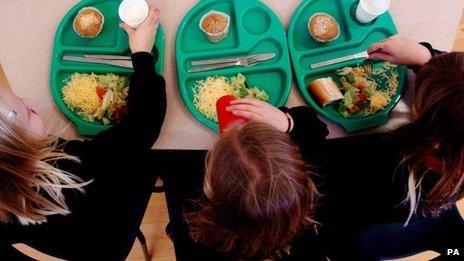Nick Clegg's free school meals funding claims 'were not true'
- Published
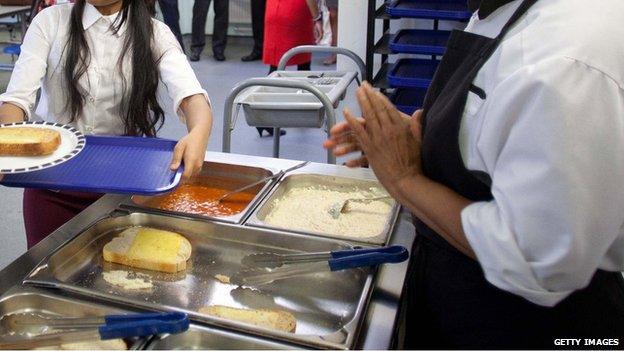
Senior Department for Education officials raised concerns the deputy prime minister misled the public about the government's free school meals policy, leaked emails show.
Nick Clegg said the cost of upgrading school kitchens could be partly met by unspent maintenance funds.
But email extracts revealed by the BBC Radio 4's World at One programme warned school places might have to be cut.
Mr Clegg's deputy, Sir Malcolm Bruce, said he had been "telling the truth".
The Lib Dem leader announced the policy, which aims to provide all pupils in the first years of primary education in England with free school meals, at his party's annual conference in September 2013.
On the World at One in March, Lib Dem Schools Minister David Laws said: "There was a serious amount of policy work that went into this, and it was costed by officials before the announcements were made at the Liberal Democrat party conference."
But the programme has been told that Education Secretary Michael Gove still did not know how the cost of the school meals was to be funded on 29 November 2013.
'Wholly unacceptable'
Mr Gove wrote to the Treasury: "Now that my officials have had time to fully analyse this policy, it is clear that it cannot be delivered for less than £449m in 2014-15 and £635m in 2015-16.
"I am sure that you will agree with me that we must not risk forcing schools to subsidise meals by reducing their spending on teaching and learning.
"I would be grateful for your assurance that my budget will be increased to fully cover the cost of this new commitment, as I am unable to fill any shortfall from within my existing budget."
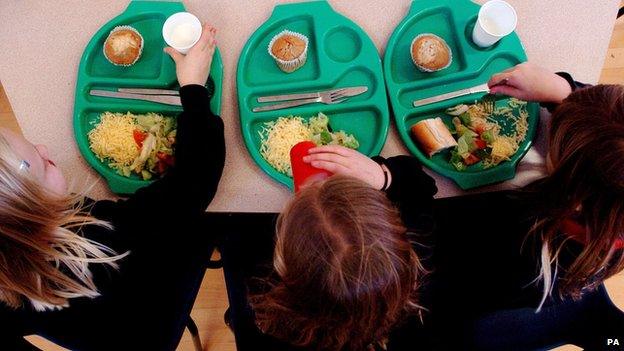
In addition, the BBC has been informed that an email dated 4 December 2013 from a senior official at the Department for Education to the private offices of Mr Clegg, Mr Laws and Chancellor George Osborne raised concerns that the money set aside for upgrading kitchens was insufficient.
"The £150m is less than the £200m we believe will actually be required to deliver this policy," it said.
"Second, more importantly, the gap between the deputy prime minister's figure and the Treasury's funding will require our secretary of state to divert money from providing school places to meet basic need or from meeting urgent maintenance needs in schools.
"Both these scenarios are wholly unacceptable to this department and our secretary of state."
'Not true'
Another email was sent from a Department for Education official to other civil servants, including in the Treasury.
"I am concerned that there is a risk that the deputy prime minister and others are about to make public statements that suggest that the additional £80m for free school meals capital can be found from within the department's budget without an impact on other education capital budgets," it said.
"This is not true, and... it will be relatively easy for people outside the department to see that it is not true."
Later that day, Mr Clegg said: "We're putting new money for instance forward to help schools expand their kitchens or buy new equipment for their kitchens."
Part of the £150m allocated to this "comes from maintenance funds that the Department for Education haven't managed to spend elsewhere", he said.
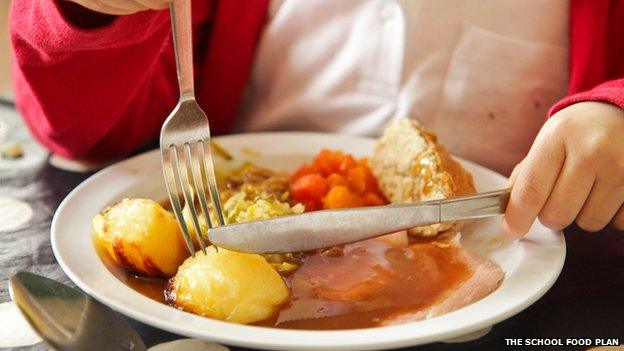
The government's website added: "£70m of this will be new money from the Treasury and around £80m will be from unspent Department for Education maintenance budgets."
The World at One has also been told that the Department for Education's permanent secretary was opposed to the way Mr Clegg's announcement had been made at the Lib Dem Conference and advised Mr Gove and Mr Laws to go slower and think through the implementation details first.
The deputy prime minister's office declined to comment. In a statement, Mr Laws told the BBC: "We do not comment on leaked documents and on budget negotiations with the Treasury.
"The funding package announced… in December was agreed across government, does not involve any reductions in capital maintenance or basic need budgets, and is judged by us to be adequate to help ensure the successful delivery of this policy - £70m of the £150m extra capital is new money from the treasury and £80m is from existing unallocated resources in the department."
'Disgruntled'
Lib Dem Sir Malcolm said: "Let's be clear, this information is being leaked, it seems to me, by Conservative sources who don't like the policy.
"But the policy has been agreed at the highest level of government. The funding has been provided, it is being rolled out, and all the children who are eligible will get their free school meals this autumn.
"It is agreed by the prime minister, the deputy prime minister, the chancellor of the exchequer, and actually the secretary of state, Michael Gove, has agreed this policy.
"And I think it would do him some good if he put a bit of constraint on some of the ideologues who are trying to undermine it and acknowledge that he has signed off on this policy and fully supports it. He should call his dogs off."
He acknowledged there had been a debate within the Department for Education on how to allocate resources.
"Michael Gove wanted that money for free schools - David Laws wanted it for free school meals," he said.
"The government agreed it should go to free school meals, and certain Conservatives are disgruntled and dissatisfied with that and are trying to undermine an agreed policy."
But the Conservative chairman of the Commons Education Committee, Graham Stuart, said the revelations broadcast on the programme show that "there are more questions to ask" over the development of the policy.
He added: "We know that Department for Education officials warned that the free school meals plan, which effectively extends free school meals to children whose parents can already afford them, risked diverting money away from badly needed extra schools places or maintenance."
- Published8 April 2014
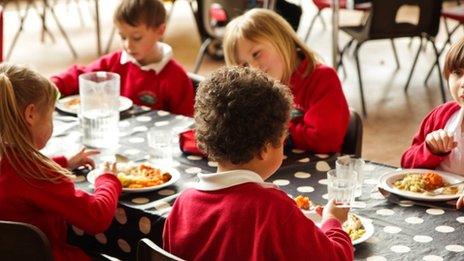
- Published20 March 2014
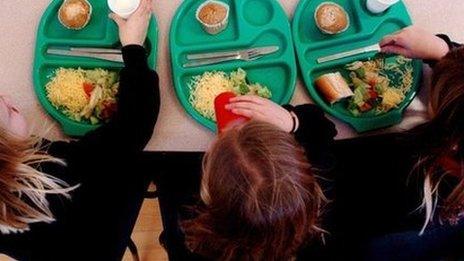
- Published11 March 2014
